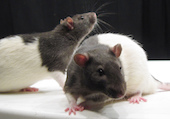The Importance of Social Interaction in Preventing Addictive Behaviour
Negative social interactions and isolation have been linked with heightened risk of drug self-administration and relapse, whereas positive social interactions can act as a protective factor against substance abuse.

Recent research, published in Nature Neuroscience, has analysed the choice made between drugs and social interaction, using rats. The rats in the study where offered a series of choices between drug (methamphetamine or heroin) and interaction with a familiar or unfamiliar rat.
The researchers found that, when presented with the option of social reward, the rats would not choose to self-administer the drug. The researchers also found that social connection also acted as a protective factor against drug cravings and relapse and they were able to link this with the expression of particular inhibitory neuron.
In humans, addiction often develops and persists despite the availability of social interaction. The researchers suggest this is perhaps because humans have a more complex method of evaluating and weighing up the level of meaning and reward of the social interaction.
Despite this, behavioural treatments that involve choosing social reward are highly effective for many people suffering from addiction. This research highlights the importance of understanding the mechanism by which these interventions may work and can help support the development and implementation of social-based behavioural treatments.